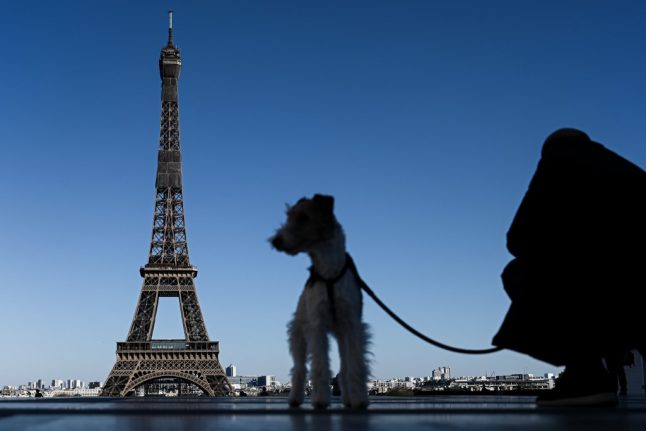The French language is rich with animal-based vocabulary, much of which is far from self-explanatory.
Here's a list of some common expressions involving several-legged and sometimes furry friends that you are likely to come across if you spend some time in France.
Haleine de chacal
Une haleine de chacal means 'a jackal's breath', and French people use it about people with bad breath. Quelle haleine de chacal! – What a foul breath!
Avoir le cafard
‘Having the cockroach’ in French is a common way of saying ‘I’m feeling blue’, which immediately doesn't seem to make sense (although it's not unlikely that having cockroaches in your home would make you depressed). But really the expression comes from the idea that bad thoughts can get into your head, spread and multiply. Plus, when they do they are really hard to get rid of – like cockroaches in the home.
Un pigeon
In French, un pigeon – 'a pigeon', like the bird – is someone that you can fool easily. Ah, quel pigeon celui-là ! – What a dumbass that one!
Une dose de cheval
'A horse's dose' is a French way of saying that something is of ‘a huge amount’ ('enough to sedate a horse'). This expression is often used about medicine, for example when you get antibiotics to cure a flu or cough medicine to get rid of a particularly bad cough. Le medecin lui a préscrit une dose de cheval ! – The doctor prescribed a huge dose (of medicine).
READ ALSO: Eleven truly bizarre French animal-related idioms explained
Doux comme un agneau
Etre doux comme un agneau means 'being soft like a lamb', and it's a way to say that someone is particularly gentle and kind. An English equivalent would be 'they wouldn't hurt a fly'.

Ducks are commonly not seen walking this freely in Paris, but during the coronavirus lockdown they seemed to get more comfortable roaming the streets. Photo: AFP
Froid de canard
Il fait un froid de canard translates to 'it’s duck cold’, which is a French way of saying that it’s really cold.
Inspired by the actual practice of duck hunting, an event that takes place in the autumn and winter, the expression comes from that the hunters have to lie completely still for an extended period of time out in the cold.
Une faim de loup
In France, 'having the hunger of a wolf' means you're starving. Il a un faim de loup means 'he's hungry like a wolf' and pretty much describes a person that would eat anything, with great gusto.
Donner sa langue au chat
This expression translates as 'giving one's tongue to the cat', which means giving up on something. If you are playing a game of cards and you can't do your turn, you can say je donne ma langue au chat – I'll pass.
Une langue de vipère
Un vipère is 'a viper' in English – a poisonous snake. Having 'a tongue of a viper' is a French expression to say that someone has poisonous tongue – metaphorically, not literally speaking. The expression is used to characterise people who talk badly behind the back of others. Je n'aime pas cette fille, c'est vraiment une langue de vipère. – 'I don't like that girl, she has such a wicked way of talking behind other people's backs'.
La vache !
Directly translated to ‘the cow’, exclaiming la vache is a French way of expressing surprise or admiration, pretty much like the English ‘holy cow!’. It usually follows after a loud oh or ah to underline the astonishment or excitement.
Say you’re in a bar in France watching a football game and someone scores an unlikely goal, well, feel free to yell oh, la vache! to show that you’re impressed, but also perhaps slightly surprised about what just happened.
Mal de chien
Avoir un mal de chien translates to ‘having a pain of dog’, which can mean two things, either that something is really painful or that someone is struggling (a lot) with a task.
Ca fait un mal de chien ! – It hurts like hell!
J'ai un mal de chien à monter cette armoire – I'm struggling like mad to put up this shelf. (If you have you ever been to Ikea, bought a shelf and tried to put it together yourself, you must be familiar with the concept. It's all blood, sweat and tears until you find yourself swearing at the instruction manual, convinced that someone did this to you on purpose.)
Tête de chien battu
Also a dog related expression, this one literally translates to ‘beaten dog face’. It has nothing to do with actually inflicting pain on a dog, however, it’s really the French equivalent to 'puppy dog eyes'. You know, when someone makes big, sad eyes to apologise for something or to get what they want.
Une poule mouillée
'A wet hen' is French for 'a coward' and you use it to say that someone is 'chickening out' on something.

Photo: AFP
Fier comme un coq
'Proud as a rooster' in French means exactly that – being extremely proud, strutting about like a well-feathered rooster. (Did you know that the rooster is the French national emblem?)
Être comme un coq en pâte
Another rooster-related expression, this one means 'being like a rooster in paste', which is an referral to an old tradition when particularly fine roosters were smeared with a special paste to conserve their feathers and transported in delicate baskets before they were sold by farmers on the market.




 Please whitelist us to continue reading.
Please whitelist us to continue reading.
Avec froid de canard il y a aussi un froid de gueux. Il y a aussi des variantes plus vulgaires!